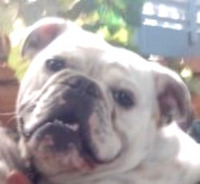Saving your pets' life in a poisoning emergency: the basics

Earl, my brother's English Bulldog.
Photo courtesy of Michael Medvegy
But, there are occasions when a situation could arise with poisoning. That's when a cool head, a pet first aid kit and some important telephone numbers can mean all the difference.
During my interview a few weeks ago with local vet, Dr. Amanda Critchfield, she not only touched on how to get the most out of your veterinary visits but also stressed the importance of being prepared in the event of a medical emergency, especially if it involves a poisoning.
It's a great idea to have on hand a pet emergency first aid kit, your primary vet's number, your local emergency veterinary clinic number (locally, Ann Arbor Animal Hospital) and the ASPCA's Poison Control Hotline 888-426-4435. The latter three should be posted in an easy to find place.
When you call the hotline, there is a $65 consultation fee that can be charged to your credit card. Dr. Critchfield, with Chelsea Animal Hospital, notes that a lot of people are put off by being charged $65 when calling the hotline. What you may not be aware of is that your primary and local emergency vets find it impossible to keep up on all of the chemicals, products, plants - and not to mention human prescription medication - that could be involved.
Additionally, there are many breeds and species of animal; all of these factors can affect a treatment course, too. When you call the hotline, you speak to a veterinary toxicologist. This highly trained individual has not only her background to draw from, but also a medical database, AnTox. This database also integrates a file that is started on your animal to coordinate a treatment plan, which in turn is immediately sent to your vet to follow through with. Ongoing communication is available between the toxicologist at the Animal Poison Control Center, (which handles roughly 375 cases per day) you and your vet to see the situation through.
Hopefully you never experience a medical emergency that involves poisoning. Being informed of the procedures and protocols before a situation arises is important, so take some time to read through the ASPCA's site to familiarize yourself with what you can do to start the process that could save your pet's life if you are ever faced with it.
Lorrie Shaw is a regular Pets Contributor to AnnArbor.com and owner of Professional Pet Sitting. She lives with her family that includes 3 pets in Dexter Twp. and can be found strolling local neighborhoods with various dogs on any given day. E-mail her at: ppsa2mi@gmail.com


Comments
HeckSpawn
Sun, May 9, 2010 : 3:08 p.m.
Our Spaniel ate some rat poison that had fallen to the floor in the garage and luckily, he was seen eating it. A quick trip to google found the best way to get him to upchuck: a couple tablespoons of household hydrogen peroxide. First dose was squirted down his throat and we waited five minutes. No reaction. A second dose was administered, and then we encouraged him to run around (not hard with this breed) and got him down on the floor for a good, vigorous belly rub. That did the trick. Within seconds, he horked it all up.
Patti Smith
Sat, May 8, 2010 : 1:50 p.m.
Buddy once ate half a box of Cocoa Puffs and some protein bars. I called the poison control line and I was only too happy to pay the (then cost) of $45. However, I will save others the cost of the consultation by telling you that if your dog goes cuckoo for Cocoa Puffs, he will run around like a hyper child (and I know from hyper children as I was one!!), go outside and take a big number two, come in and crash. That's exactly what he did and he lived to get into more mischief another day.
bunnyabbot
Sat, May 8, 2010 : 1:42 p.m.
I had no idea that avocado tree was poisonous to dogs until I just happened to want to see what was on the poison list for pets. I think it is a good idea for everyone to just go online and do a search to familiarize themselves with household stuff that could be poisonous and plants etc. I have had the plant for 4 years and the dog for just as long, he has never shown an interest in it but he has in the dirt whenever it is newly potted. He just goes over to smell it. I don't want to risk him eating a fallen leaf or the part of the pit. So now the plant is barricaded off. I think it is also a good idea to train your pet to back off from stuff if you should drop it. If I drop something that he could eat like a pill that would be poisonous I have used the word "poison" and he will leave it alone so that I can pick it up. I also say poison whenever the dishwasher is open, I never understand how people let their cats or dogs jump up onto the open door, detergent is not safe for animals to lick.